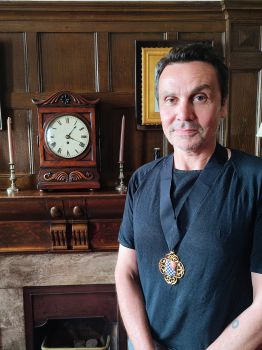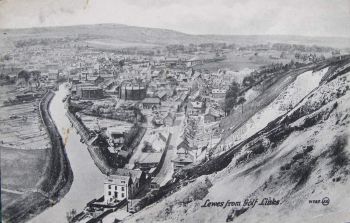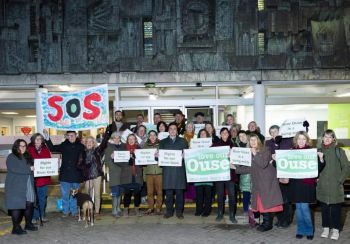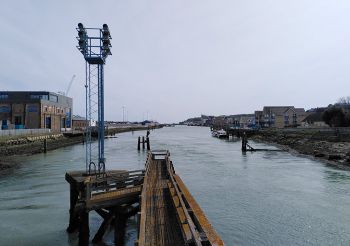“If we upset the natural balance…it's not good for the species that make up this fabulous planet”
By: Serena Mitchell
Last updated: Tuesday, 9 January 2024

Cllr Matthew Bird, Mayor of Lewes

River Ouse through Lewes, 1923, source: Love Our Ouse

Group of Rights of the River campaigner holding placards, outside Council buildings, source: Love Our Ouse

The River Ouse flowing through Newhaven port, source: Love Our Ouse
Matthew Bird is a Sussex alum (BSc Geography with Environmental Development Studies 1997). He is also the Mayor of Lewes and a Green councillor who is passionate about environmental issues and community engagement. He is a Chartered Environmentalist and has a career in Sustainability and Climate Change working at local authorities and Sussex Wildlife Trust amongst other organisations.
Matthew recently spoke to us about his experience at Sussex, his involvement in the rights of rivers movement and working with Business School students and faculty.
Studying at Sussex
Matthew chose to study at Sussex because of its reputation for being a progressive and innovative university. He liked the interdisciplinary approach of the School of African and Asian Studies and took the opportunity to do a field trip in Zimbabwe as part of his course.
“The field trip was around community-based natural resource management and participatory rural development. Professor Robert Chambers had developed a lot of this work and was based at the Institute of International Development Studies at Sussex, which at the time and then afterwards, I realized how massive that was,” he says.
He also learned how to use community mapping and other tools as a means of engagement, which he still uses today in his work.
“I’ve been using it with the Rights of the River work to engage people with the river, to capture views on pollution or daily interactions with the river Ouse. Recently I was talking to someone who’s doing some work with us on rights of rivers and is in contact with Robert Chambers and mentioned to him that we were using his techniques. Apparently, that tickled him!.”
Rights of the River campaign
Matthew is also one of the leading figures in the Rights of the River campaign, which aims to recognize the river as a living entity with its own rights and interests. He was inspired by a film called Invisible Hand, which showed how a community in the US used the rights of nature approach to challenge a fracking company. He and some local people in Lewes formed Love Our Ouse and organized a river festival and a workshop to draft a declaration charter of rights for the river. Later as Cabinet Councillor for Sustainability he presented a motion on Rights of the River to Lewes District Council.
“We were the first council to get it through and it was quite monumental in that only two Conservatives voted against it. It was the first rights of rivers motion to succeed,” he says.
“The Declaration of Rights for the River covers aspects such as water quality, climate change impacts, natural flow, stable aquifers, and more. The goal is to give the river legal standing and an independent voice, as some countries like New Zealand and Colombia have done.”
Matthew explains that this and rights of nature is a change in thinking that places the river at the front and centre of decision-making, rather than as a resource thought about in relation to humans.
“We must go back to this sense that we are equals with the natural world, we are not dominant over it. If we upset the natural balance, as we have, it’s not good for us, and it’s not good for the species and the beings and the non-human entities that make up this fabulous planet,” he says.
He also points out that the River Ouse has a history of being heavily modified and polluted by human activities, such as tanning, agriculture, and navigation. He shows a photo of the river from 100 years ago and compares it with a photo from today, to illustrate how much the river has changed.
“The river was this very industrial place, being heavily modified. The lower Ouse was straightened for barges and agricultural use. It was very much about what the river can do for us. The modifications on the upper Ouse were very short-lived because they expected the river to be the main highway transport network, but then the railways came along. So a lot of that work was done in vain.”
Working with Sussex
Matthew also maintains a strong connection with the University of Sussex, as he works with different faculties and students on various projects related to sustainability and climate change. He has learned a lot from his collaboration with Sussex and that he appreciates the support and expertise that the University provides.
He recently hosted a group of students from the Business School who were working on sustainability projects with a local consultant. They discussed the challenges and approaches to implementing sustainability and climate action in Lewes.
Matthew has also received pro bono support from one of the lawyers who worked on the Ecuadorian constitution, which recognizes the rights of nature.
“She came to visit us, and she was interested in what we were doing. She’s given us 20 days of pro bono support to help us advance the Rights of the River campaign and to learn from the international experience. How exciting is that? I think we are showing the way for others to follow,” he says.
Matthew has worked with the Science Policy Research Unit (SPRU) at the Business School and others on community energy projects, renewables, efficiency, and innovation.
“When I look back to my undergraduate degree at Sussex, I can see how the root of the work I do today took hold then. It’s great to see the Business School is a member of the UN’s Global Compact and embedding the Sustainable Development Goals across its curriculum. I’m pleased to share my knowledge with today’s students on the various collaborative projects I’m involved with.”
For information about the Rights of the River and Lewes Town Council, visit:


